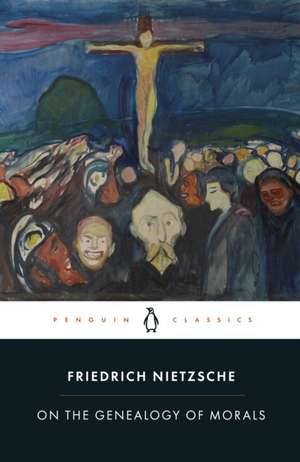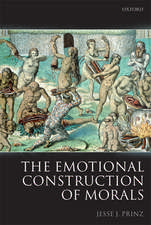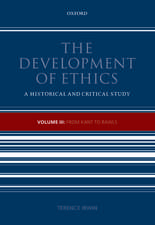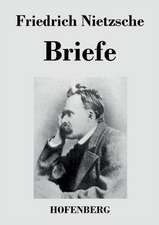On the Genealogy of Morals
Autor Friedrich Nietzsche Editat de Robert C. Holub Traducere de Michael A. Scarpittien Limba Engleză Paperback – 6 noi 2013
Nietzsche claimed that the purpose ofThe Genealogy of Moralswas to call attention to his previous writings. But in fact the book does much more than that, elucidating and expanding on the cryptic aphorisms ofBeyond Good and Eviland signalling a return to the essay form. In these three essays, Nietzsche considers the development of ideas of 'good' and 'evil'; explores notions of guilt and bad consience; and discusses ascetic ideals and the purpose of the philosopher. Together, they form a coherent and complex discussion of morality in a work that is more accessible than some of Nietzsche's previous writings.
Friedrich Nietzsche was born near Leipzig in 1844. When he was only twenty-four he was appointed to the chair of classical philology at Basel University. From 1880, however, he divorced himself from everyday life and lived mainly abroad. Works published in the 1880s includeThe Gay Science,Thus Spoke Zarathustra,Beyond Good and Evil,On the Genealogy of Morals,Twilight of the IdolsandThe Antichrist. In January 1889, Nietzsche collapsed on a street in Turin and was subsequently institutionalized, spending the rest of his life in a condition of mental and physical paralysis. Works published after his death in 1900 includeWill to Power, based on his notebooks, andEcce Homo, his autobiography.
Michael A. Scarpitti is an independent scholar of philosophy whose principal interests include English and German thought of the eighteenth and nineteenth centuries, as well as exegesis and translation theory.
Robert C. Holub is currently Ohio Eminent Scholar and Professor of German at the Ohio State University. Among his published works are monographs on Heinrich Heine, German realism, Friedrich Nietzsche, literary and aesthetic theory, and Jürgen Habermas.
| Toate formatele și edițiile | Preț | Express |
|---|---|---|
| Paperback (2) | 62.81 lei 3-5 săpt. | +6.55 lei 5-11 zile |
| Oxford University Press – 14 aug 2008 | 62.87 lei 2 zile | |
| Penguin Books – 6 noi 2013 | 62.81 lei 3-5 săpt. | +6.55 lei 5-11 zile |
Preț: 62.81 lei
Nou
Puncte Express: 94
Preț estimativ în valută:
12.02€ • 13.06$ • 10.11£
12.02€ • 13.06$ • 10.11£
Carte disponibilă
Livrare economică 31 martie-14 aprilie
Livrare express 15-21 martie pentru 16.54 lei
Preluare comenzi: 021 569.72.76
Specificații
ISBN-13: 9780141195377
ISBN-10: 0141195371
Pagini: 208
Dimensiuni: 129 x 198 x 12 mm
Greutate: 0.16 kg
Editura: Penguin Books
Colecția Penguin Classics
Locul publicării:London, United Kingdom
ISBN-10: 0141195371
Pagini: 208
Dimensiuni: 129 x 198 x 12 mm
Greutate: 0.16 kg
Editura: Penguin Books
Colecția Penguin Classics
Locul publicării:London, United Kingdom
Notă biografică
Friedrich
Nietzsche
was
born
near
Leipzig
in
1844.
When
he
was
only
twenty-four
he
was
appointed
to
the
chair
of
classical
philology
at
Basel
University.
From
1880,
however,
he
divorced
himself
from
everyday
life
and
lived
mainly
abroad.
Works
published
in
the
1880s
includeThe
Gay
Science,Thus
Spoke
Zarathustra,Beyond
Good
and
Evil,On
the
Genealogy
of
Morals,Twilight
of
the
IdolsandThe
Antichrist.
In
January
1889,
Nietzsche
collapsed
on
a
street
in
Turin
and
was
subsequently
institutionalized,
spending
the
rest
of
his
life
in
a
condition
of
mental
and
physical
paralysis.
Works
published
after
his
death
in
1900
includeWill
to
Power,
based
on
his
notebooks,
andEcce
Homo,
his
autobiography.
Michael A. Scarpitti is an independent scholar of philosophy whose principal interests include English and German thought of the eighteenth and nineteenth centuries.
Robert C. Holub is currently Ohio Eminent Scholar and Professor of German at the Ohio State University. Among his published works are monographs on Heinrich Heine, German realism, Friedrich Nietzsche, literary and aesthetic theory, and Jürgen Habermas.
Michael A. Scarpitti is an independent scholar of philosophy whose principal interests include English and German thought of the eighteenth and nineteenth centuries.
Robert C. Holub is currently Ohio Eminent Scholar and Professor of German at the Ohio State University. Among his published works are monographs on Heinrich Heine, German realism, Friedrich Nietzsche, literary and aesthetic theory, and Jürgen Habermas.
Descriere
Descriere de la o altă ediție sau format:
`Reason, seriousness, mastery over the emotions, the whole murky affair which goes by the name of thought, all the privileges and showpieces of man: what a high price has been paid for them! How much blood and horror is at the bottom of all "good things!"' On the Genealogy of Morals (1887) is a book about the history of ethics and about interpretation. Nietzsche rewrites the former as a history of cruelty, exposing the central values of the Judaeo-Christian and liberal traditions - compassion, equality, justice - as the product of a brutal process of conditioning designed to domesticate the animal vitality of earlier cultures. The result is a book which raises profoundly disquieting issues about the violence of both ethics and interpretation. Nietzsche questions moral certainties by showing that religion and science have no claim to absolute truth, before turning on his own arguments in order to call their very presuppositions into question. The Genealogy is the most sustained of Nietzsche's later works and offers one of the fullest expressions of his characteristic concerns. This edition places his ideas within the cultural context of his own time and stresses the relevance of his work for a contemporary audience. ABOUT THE SERIES: For over 100 years Oxford World's Classics has made available the widest range of literature from around the globe. Each affordable volume reflects Oxford's commitment to scholarship, providing the most accurate text plus a wealth of other valuable features, including expert introductions by leading authorities, helpful notes to clarify the text, up-to-date bibliographies for further study, and much more.
`Reason, seriousness, mastery over the emotions, the whole murky affair which goes by the name of thought, all the privileges and showpieces of man: what a high price has been paid for them! How much blood and horror is at the bottom of all "good things!"' On the Genealogy of Morals (1887) is a book about the history of ethics and about interpretation. Nietzsche rewrites the former as a history of cruelty, exposing the central values of the Judaeo-Christian and liberal traditions - compassion, equality, justice - as the product of a brutal process of conditioning designed to domesticate the animal vitality of earlier cultures. The result is a book which raises profoundly disquieting issues about the violence of both ethics and interpretation. Nietzsche questions moral certainties by showing that religion and science have no claim to absolute truth, before turning on his own arguments in order to call their very presuppositions into question. The Genealogy is the most sustained of Nietzsche's later works and offers one of the fullest expressions of his characteristic concerns. This edition places his ideas within the cultural context of his own time and stresses the relevance of his work for a contemporary audience. ABOUT THE SERIES: For over 100 years Oxford World's Classics has made available the widest range of literature from around the globe. Each affordable volume reflects Oxford's commitment to scholarship, providing the most accurate text plus a wealth of other valuable features, including expert introductions by leading authorities, helpful notes to clarify the text, up-to-date bibliographies for further study, and much more.

























